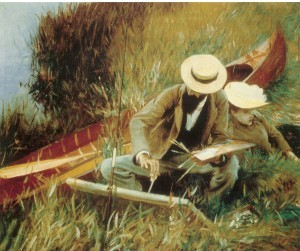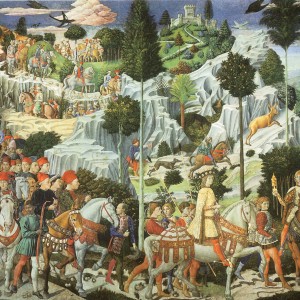 Picture the scene. Freshman university students are sitting packed into a room that is obviously too small to hold the entire class. The eminent Dr. Phil O’Sophy enters and sizes up the audience. “Some of them will have to go,” he muses. Without a word of introduction he turns to the blackboard and scrawls, CAN ANYTHING BE KNOWN?. He announces to the class, “I want 500 words in answer to this question by Wednesday.” He walks out of the room. The students look at one another in stunned silence. Professor O’Sophy will get his wish. Half the class fails to show on Wednesday.
Picture the scene. Freshman university students are sitting packed into a room that is obviously too small to hold the entire class. The eminent Dr. Phil O’Sophy enters and sizes up the audience. “Some of them will have to go,” he muses. Without a word of introduction he turns to the blackboard and scrawls, CAN ANYTHING BE KNOWN?. He announces to the class, “I want 500 words in answer to this question by Wednesday.” He walks out of the room. The students look at one another in stunned silence. Professor O’Sophy will get his wish. Half the class fails to show on Wednesday.
This fictionalized account is repeated in classroom after classroom in many of our major universities every fall. But it’s not the old ploy of knocking down class size with which we are concerned here; it’s the question.
- Can anything be known?
- Is there such a thing as truth?
- If so, what is it?
- How do I get it?
- What do I do with it if it is obtained?
The pursuit of truth is as old as man himself. Before God even creates Adam, we read, “In the beginning God…” GOD, the first person spoken of in the Bible. The very word denotes majesty; that basis for all that there is; the sustainer of all creation; or, as we read in John 14:6, the very essence of all sound knowledge. In other words God is Truth and because he is Truth, in Him can be found no Lie. Hence the inspiration for the second year of the study of the Great Ideas through the Great Books.
Because God (Truth) created man, we are stamped with His image. It comes as no surprise then that man has always sought after the Truth. What makes the pursuit of Truth so difficult is that the Fall of man, precipitated in part by the Father of Lies, Satan, has resulted in our loss of perfection. We are now a deeply flawed creation – totally depraved in fact; that is, every inclination is toward sin. This has made man’s pursuit of Truth perilous and, as is his nature, has devised a veritable obstacle course on which to run this race.
For many, to speak the truth is to merely say what we think or believe. Conversely, to lie is to say the opposite of what we think or believe. As commendable as it may be to “tell the truth” in this sense, this definition does not satisfy at least one aspect of the Ideas of Truth and Lies. For example, someone may say what they think or believe and be entirely in error because their beliefs are based on falsehoods. Therefore, a study of Truth and Lies must be more than learning to tell the truth as we know it. It must get to the heart of the age old questions: What ultimately is true? and How do we know Truth?
Number of Credits: 2
Tuition: $325 (material costs extra)
Online-based course Tuition: $400
View a sample of the course outline.
View a sample of the online class course outline.
Great Ideas Through the Great Books: Level 2 (Truth and Lies) Course
SKU: GIL2SET.
Build Order
Note: Please select the items for the Great Ideas course as needed. This set is to make it easier for educators to quickly purchase all materials required for a level.
The Study of the Great Ideas Through the Great Books is written for students who typically would be in Grades 9 to 12 (14-18 years of age)…although gifted students a bit younger may benefit from this program depending on their skill set and needs. Scroll down and read the product description for information specific to Level 2 (Truth & Lies).
Great Ideas Level 2 is an advanced TWO credit course covering topics common to English Literature, Composition, Religious Studies and Philosophy.
Picture the scene. Freshman university students are sitting packed into a room that is obviously too small to hold the entire class. The eminent Dr. Phil O’Sophy enters and sizes up the audience. “Some of them will have to go,” he muses. Without a word of introduction he turns to the blackboard and scrawls, CAN ANYTHING BE KNOWN?. He announces to the class, “I want 500 words in answer to this question by Wednesday.” He walks out of the room. The students look at one another in stunned silence. Professor O’Sophy will get his wish. Half the class fails to show on Wednesday.
This fictionalized account is repeated in classroom after classroom in many of our major universities every fall. But it’s not the old ploy of knocking down class size with which we are concerned here; it’s the question.
- Can anything be known?
- Is there such a thing as truth?
- If so, what is it?
- How do I get it?
- What do I do with it if it is obtained?
The pursuit of truth is as old as man himself. Before God even creates Adam, we read, “In the beginning God…” GOD, the first person spoken of in the Bible. The very word denotes majesty; that basis for all that there is; the Sustainer of all creation; or, as we read in John 14:6, the very essence of all sound knowledge. In other words God is Truth and because he is Truth, in Him can be found no Lie. Hence the inspiration for the second year of our Study of the Great Ideas through the Great Books…Truth & Lies.
Because God (Truth) created man, we are stamped with His image. It comes as no surprise then that man has always sought after the Truth. What makes the pursuit of Truth so difficult is that the Fall of man, precipitated in part by the Father of Lies, Satan, has resulted in our loss of perfection. We are now a deeply flawed creation. This has made man’s pursuit of Truth perilous and, in his sin, he has devised a veritable obstacle course on which to run this race. In fact, our present culture has fallen so far as to proudly declare that truth is whatever we want it to be. It follows then that there can be no such thing as a lie…or at least, that the only lie is what does not fit my own version of truth. But the fact is that Truth and Lies exist, and it is necessary for all who declare intellectual honesty to determine what is indeed True and then to act on what is discovered. To not do so is to live a Lie.
Click here for a comparison of the self-paced and online versions of the course.
Click here for a sample of the self-paced edition of the Student Manual for Level 2.
Click here for a sample of the on-line edition of the Student Manual for Level 2.

 Picture the scene. Freshman university students are sitting packed into a room that is obviously too small to hold the entire class. The eminent Dr. Phil O’Sophy enters and sizes up the audience. “Some of them will have to go,” he muses. Without a word of introduction he turns to the blackboard and scrawls, CAN ANYTHING BE KNOWN?. He announces to the class, “I want 500 words in answer to this question by Wednesday.” He walks out of the room. The students look at one another in stunned silence. Professor O’Sophy will get his wish. Half the class fails to show on Wednesday.
Picture the scene. Freshman university students are sitting packed into a room that is obviously too small to hold the entire class. The eminent Dr. Phil O’Sophy enters and sizes up the audience. “Some of them will have to go,” he muses. Without a word of introduction he turns to the blackboard and scrawls, CAN ANYTHING BE KNOWN?. He announces to the class, “I want 500 words in answer to this question by Wednesday.” He walks out of the room. The students look at one another in stunned silence. Professor O’Sophy will get his wish. Half the class fails to show on Wednesday. 



Reviews
There are no reviews yet.